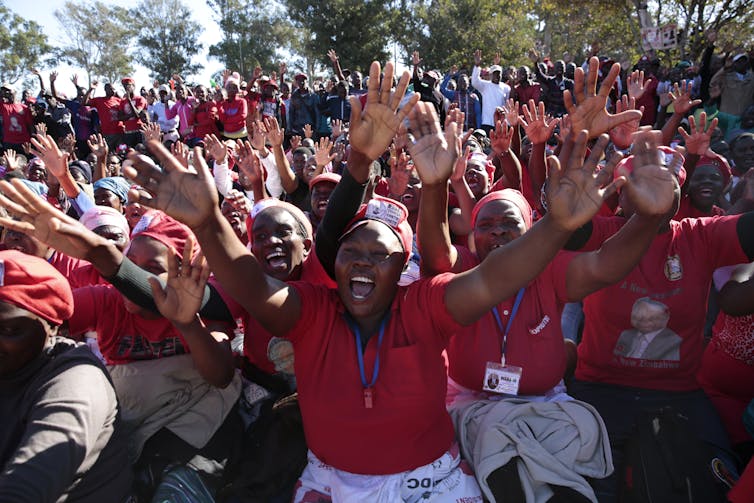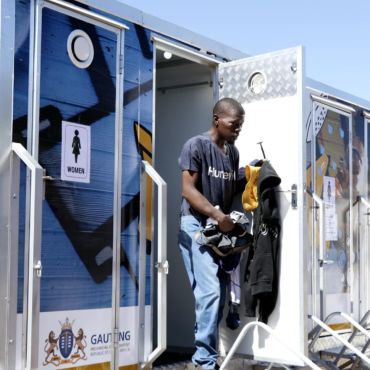-
play_arrow
On The Street On The Air | Kaya 959
Why Zimbabwe’s first elections after the Mugabe ouster are so significant
By: Gift Mwonzora, Rhodes University

Aaron Ufumeli/EPA
The July 30 general election in Zimbabwe is significant because it marks the end to a campaign season which for the first time in decades has been without the influence of ousted president, Robert Mugabe. Unless the election fails to produce an outright winner with a 50+1 majority as stipulated by law, Zimbabweans will soon know who their next leader will be. The new president will serve a five year term.
The election comes just a few months after Mugabe was ousted at the military’s instigation. It will determine the country’s future in the world after so many years of being ostracised from the international community. The outcome will also shape Zimbabwe’s political and economic outlook. And it goes without saying that the onus will be on the new leader to usher in a new era for Zimbabweans.
‘Zimbabwe is open for business’
Despite the optimism and cautious hope that surrounded Emmerson Mnangagwa’s ascendancy to power, the economic situation in Zimbabwe has remained unchanged. The economy, which collapsed under Mugabe’s rule, is not yet out of the woods.
Despite its “Zimbabwe is open for business” mantra, Mnangagwa’s administration has battled to resuscitate the struggling economy. In the run-up to the polls the country remains afflicted by high unemployment , de-industrialisation and a severe liquidity crisis. This has affected the livelihoods of ordinary citizens many of who have resorted to eking out a living through street vending to put food on the table. The cost of living remains very high and those in the informal sector have borne the brunt.
Mnangagwa has promised to fix the economy and to lift the majority of Zimbabweans out of poverty.
As if reading from the same script, the main opposition candidate Nelson Chamisa has also promised to open Zimbabwe up to foreign investors, as well as to remedy the economic malaise that spread like a virus during the Mugabe era.
Winning hearts and minds
While on the campaign trail, the two main candidates, Chamisa (of the Movement for Democratic Change – Alliance) and Mnangagwa (of the ruling Zanu-PF), both promised heaven and earth. It therefore comes as no surprise that opinion polls and support on the ground for both candidates point to the fact that this election is a two-horse race between the MDC-Alliance, and Zanu-PF.
Chamisa has promised major infrastructural development that will include the transformation of rural economies into industrial hubs, an effective rail system boosted by the introduction of bullet trains, and the construction of modern freeways in Zimbabwe’s cities and towns.
In terms of economic revival both candidates have vowed to pursue foreign direct investment. Both say they will pay off Zimbabwe’s debts to the International Monetary Fund and the World Bank.
They have both promised to root out corruption and address the land issue. Mnangagwa has said that the era of land grabs, multiple farms, and idle ownership is over. This has also been the same narrative from the MDC-Alliance. Both leaders have also said that they’ll work to salvage Zimbabwe’s international image.
There are clearly more similarities than differences between the two main contenders and their pledges to voters. But a few distinguishing factors remain evident.
Chamisa’s campaign is selling hope to the electorate. He has made good use of his great oratory skills to strike a hopeful chord with voters.
Mnangagwa, on the other hand, is focused on reform and stability. He has made frequent mention of the ‘successes’ of his “new dispensation”, namely combating corruption, securing investment commitments, and kickstarting economic recovery. This is a tactic that is designed to justify why the electorate should give him a second bite at the cherry.
Tight race
It will be interesting to gauge whether rally attendance will translate into votes as Zimbabweans go to the polls. Both Zanu-PF and the MDC-Alliance recorded well-attended rallies, though the opposition has several times lampooned Zanu-PF for bussing school children in to shore up support at its rallies.
If rally attendance is anything to go by, it would seem that the race is too close to call. With that being said, rally attendance might not be the best yardstick to measure popular support.
Important to keep in mind, however, is that citizens attend rallies for varied reasons . Some go for entertainment purposes; some are forced, and some are in search of free T-shirts, party paraphernalia, food, and drink. Others attend just to see their political idols in the flesh.
No steps are taken at these rallies to determine if attendees are registered voters.
And then there is the issue of opinion polls. A recent opinion poll by Afrobarometer is predicting that Mnangagwa will garner 40% of the vote, with 37% for Chamisa. About 20% of respondents refused to disclose their preferences and 3% said they would vote for other parties.
![]() Even with the knowledge that opinion polling is not an exact science it is likely to be a tight race between Mnangagwa, the establishment candidate, and Chamisa, his youthful contender.
Even with the knowledge that opinion polling is not an exact science it is likely to be a tight race between Mnangagwa, the establishment candidate, and Chamisa, his youthful contender.
Gift Mwonzora, Post-Doctoral Research fellow (specializing in Political Sociology) in the Unit of Zimbabwean studies – Sociology Department at Rhodes University, South Africa., Rhodes University
This article was originally published on The Conversation.
Written by: Natasha
Elections News Politics Zimbabwe
Similar posts
-
MORE ARTICLES

Do we drive with our egos?

“I am led to pass the baton down to you” – Ayanda Ncwane encourages her son to follow his father’s footsteps

Defence in Senzo Meyiwa trial wants Kelly Khumalo to be subpoenaed

Mobile shower services for homeless people in Gauteng launched

Minister Zizi Kodwa congratulates Innocent Masuku on his sterling performance in Britain’s Got Talent
-
QUICK LINKS
UpComing Shows

Feel Good
With Andy Maqondwana
Feel good about feeling good! That's exactly what The Feel-Good show is about. An escape from the negativity that surrounds us, indulging you in good feels. Pass it on to one and all. Spread the good feeling around Gauteng with Andy Maqondwana.
close
Kaya Biz
With Gugulethu Mfuphi
The world of business is simplified for you by Kaya Biz with Gugulethu Mfuphi. This fast-paced award-winning business show talks to the corporate giants as well as up and coming entrepreneurs about their wins and challenges. Gugulethu invites guests to offer their analyses of markets and economies, and also delves into issues of personal financial wellness. Kaya Biz airs Mondays to Thursdays 18h00 to 19h00.
close
Point of View
With Phemelo Motene
Point of View with Phemelo Motene delves into the day’s current affairs, touches on real issues that affect people’s daily lives and shares expert advice on questions posed by the audience. Mondays to Thursdays 20:00 to 22:00.
close
959 Music Weekdays
Kaya 959 Hits
Real. Familiar. Memorable. Kaya 959 brings you the music you know and love from our playlist. Uninterrupted. Thursdays 20h00 to 21h00
close
The Best T in the City
With T Bose
He has held it down in the world of mid-morning radio with the best music, riveting topics, brilliant mixes and interesting guests. Every weekday, The Best T proves why he is the BEST by connecting to you like only your bro or favourite uncle could. He lets his listeners dictate the songs they want to hear in the ever-popular Top 10 at 10, and his Three Teaspoons never run out. Catch The Best T in the City Mondays to Fridays from 09h00 to 12h00.
closeConnect with Kaya 959
DownLoad Our Mobile App
© 2024 Kaya 959 | On The Street On The Air











